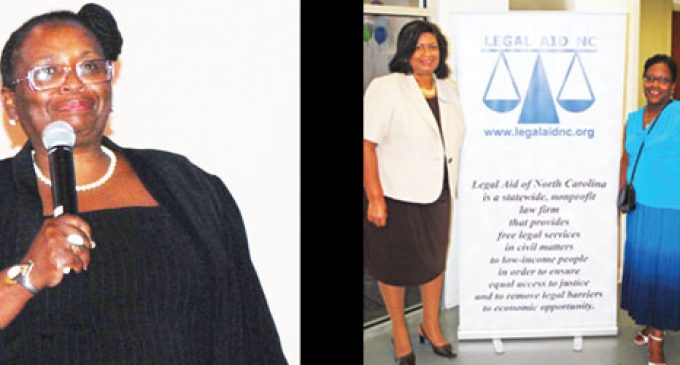Legal Aid marks 50 years of advocacy

Legal Aid of North Carolina (LANC) celebrated its 50th anniversary last Thursday in the city where it began.
Winston-Salem’s Milton Rhodes Center for the Arts hosted the anniversary celebration, which drew legal professionals from across the state. The agency provides free legal services to low income clients in a variety of civil issues, including domestic violence, foreclosures and evictions and employment law. Each year, LANC helps 25,000 people.
“If all the people in Forsyth County who have benefitted from the services of Legal Aid were to come this evening, we’d have to move this event to the Wake Forest stadium,” said Judge Denise Hartsfield, a former Legal Aid lawyer who emceed the celebration.
The legal aid movement have grown over the years, and offices have opend in other N.C. cities. The LANC network now provides legal services to all of the state’s 100 counties.
Many former and current Legal Aid employees reminisced about the agency’s history, which began in 1962, when lawyers from the local Junior Bar Association started the Legal Aid Society of Forsyth County.
Over the years, the agency expanded to serve surrounding counties and was renamed the Legal Aid Society of Northwest North Carolina before it merged with Winston-Salem Legal Aid, a separate non-profit legal assistance agency, in 2007.
Lennie Gerber, a former Legal Aid Society managing attorney, recalled being the agency’s only female when she arrived in 1977. When she left in 1991, most of the staff was female, she said.
Hazel Mack, who has worked at Legal Aid for 24 years and is now the Triad regional director, told attendees that her background is similar to those of the clients she serves.
“I understood what it’s like to be locked out, what it’s like to be poor, what it’s like not to have access to justice,” said Mack.
Because of the services that Legal Aid provides, no citizen is legally shut out.
“That’s the difference between what this country represents to me and people like me: that no matter where you start, no matter what your humble beginnings, there’s a way in,” said Mack.
Former Legal Aid Society Director Thorns Craven said that there was controversy in the early years, as lawyers who were used to facing no legal opposition in court, suddenly found themselves facing off with Legal Aid attorneys. Craven said the then-head of the N.C. Bar Association even threatened to disbar attorneys affiliated with Legal Aid.
Funding has always been a challenge for Legal Aid, Craven said. A charitable donation from an anonymous source started the local office. Over the years, it has stayed open through a variety of funding sources, including funds from the United Way. Today, the agency relies mostly on the Legal Services Corporation (LSC), a federally-chartered corporation that distributes funds to Legal Aid agencies nationally, but that funding constantly fluctuates under political and fiscal pressures in the U.S. Congress. Currently, due to LSC budget cuts, LANC has laid off about 30 staff and closed three offices statewide, despite a higher demand for the agency’s services.
In 2002, to streamline services, all the state offices joined together to form LANC. George Hausen Jr, LANC executive director, described his organization as a “law firm for poor people.” He said though the services are free, the agency’s services are top notch, provided by “lawyers’ lawyers” who hone their craft and practice it with professionalism.
“In 50 years we haven’t eliminated poverty or racial injustice or any type of injustice,” said Hausen. “Equal access is something we strive to attain; it’s elusive.”
Yvette Stackhouse, managing attorney of the Winston-Salem Legal Aid office, said the work the agency is doing to help families facing foreclosure is among its most important ever. With the housing market still recovering, LANC currently has 1,000 active foreclosure cases statewide.
Stackhouse said Legal Aid is often the place people go to in times of crisis. She said many didn’t even know they had legal recourse before coming to the agency.
“We give voice to those who have no voice or think they don’t have one,” said Stackhouse. “There are so many people who don’t even know what their rights are.”
For more information about Legal Aid, visit HYPERLINK “http://www.legalaidnc.org” www.legalaidnc.org or call the local office at 725-9162.















